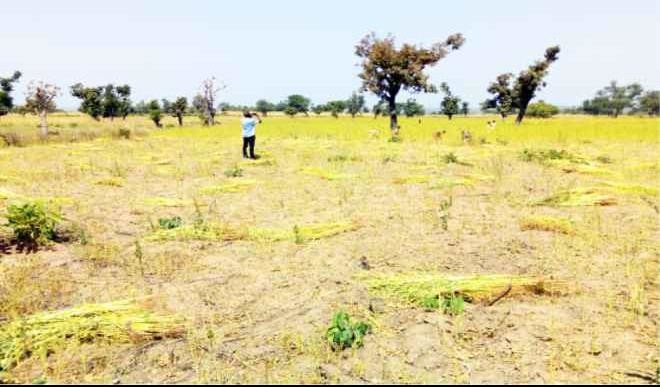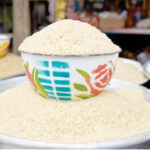
Asla Akpu Alla is a 62-year-old farmer who has been cultivating crops like groundnut, sesame, sorghum, maize and rice in the last 26 years.
Talking about his farming activities in Doma, Nasarawa State, last week, he told Daily Trust on Sunday that, “You need to see how much we harvested from this land 40 years ago. There was nothing like erratic rainfall, army- worms, or even flood in this area. Today, a lot has changed. From one disease to another, one can hardly also predict the weather anymore.”
He said the harvest of rice was low this year despite applying five bags of fertiliser in his 1.5 hectares, and that he did not understand what happened to the crop.
Mr. Alla believes a lot of changes have occurred in recent years regarding farming, even though he is not educated to understand what experts refer to as climate change.
“Harvests are not like before, even if you apply fertiliser. Before now, the rain would start around March here in Doma, but these days, it starts in May. These days, it is also difficult to grow the crops we are used to. You have to apply this or that. And I no longer make money like before,” he lamented.
Like Asla Akpu, thousands of small scale farmers across Nigeria are going through difficult times, no thanks to climate change.
Emmanuel Michael, 33, who cultivates maize and rice in Awe, Nasarawa State, said that to be a successful farmer, one would need more agrochemicals, fertiliser and pesticides.
“The cost of production is rising and shrinking profits,” he said, adding that he suffered this year because flood and armyworms destroyed his farms.
“Draught and lack of grasses are also pushing the Fulani down here and they are invading our farms to locate grasses. There is massive land up North, but continuous low rainfall does not allow the grasses to grow,” Michael said.
Still in the North, desert encroachment is fast eating up arable lands and smallholder-farmers are defenseless, although some states are planting more trees to control it.
Flood, draught, rising global temperature or global warming, pests and diseases and other climate change related disasters are on the increase, and smallholder-farmers are the most vulnerable.
The Food and Agriculture Organisation of the United Nations, in a report released few weeks ago, stated that the number of individuals suffering from hunger in sub Sahara hit 224 million in 2016 as a result of climate change and conflict. This represents an increase of 10per cent.
The Food and Agriculture Organisation (FAO) also said cases of malnutrition had gone up to 22.7per cent from 20.8per cent between 2015 and 2016, adding that African governments need to address these challenges quickly.
The International Fund for Agricultural Development (IFAD) announced that the German Government had agreed to release €20m to the organisation in order to help smallholder-farmers in developing countries fight the shock of climate change and improve their food security.
The associate vice president of the IFAD, Périn Saint Ange, said, “These funds will not only help in our efforts to adapt smallholder agriculture to climate change, but they will have additional benefits related to other important cross-cutting issues like gender equality, youth unemployment and nutrition security.
“These efforts will go a long way to helping the world’s smallholder-farmers who generate up to 80 per cent of the food produced in many developing countries, access the information, the inputs and the technologies they need to face the increasing risks to their lives and livelihood posed by climate change.”
In Abuja, the Federal Government and Consultative Group for International Agricultural Research (CGIAR), last week, launched a roadmap for evidence-based insurance development for Nigeria’s farmers.
While launching the roadmap, the permanent secretary, Federal Ministry of Agriculture and Rural Development, Dr. Bukar Hassan, stated that the blueprint had become necessary as the problem of climate change had become impactful in the nation’s agricultural sector.
“Our agriculture is rain-fed dependent as farmers rely hugely on the vagaries of weather and climate (onset, cessation, intensity, amount and duration). Though it has been acknowledged that climate change is a global phenomenon and a reality, its impact has been devastating, as floods or draught can wipe out the entire harvest of farmers. This was the case of our farmers in 2012 and recently in 2017,” Dr. Hassan said.
He reiterated that the launch strengthened insurance in Nigeria’s agricultural resilience and would enable the financial sector to support new insurance and financial packages for farmers.
The team leader of the CGIAR at the event, Dr. James Hansen, who is also the flagship leader of the Climate Services and Safety Nets and a senior research scientist at the International Research Institutive for Climate and Society (IRI), Colombia University, USA, said climate posed significant risks to agricultural development, and by extension, food security, poverty reduction and political stability.
“It threatens sustained economic growth, especially in Nigeria, where agriculture contributes over 40 per cent of the Gross Domestic Product (GDP). Over 70 per cent of the workforce is engaged in agriculture-related activities, and millions residing in rural areas depend on agriculture for their livelihood,” he said.
The CGIAR, through its research programme on Climate Change, Agriculture and Food Security (CCAFS), is working with the Federal Government and other agencies to mitigate the effects of climate change in Nigeria.




